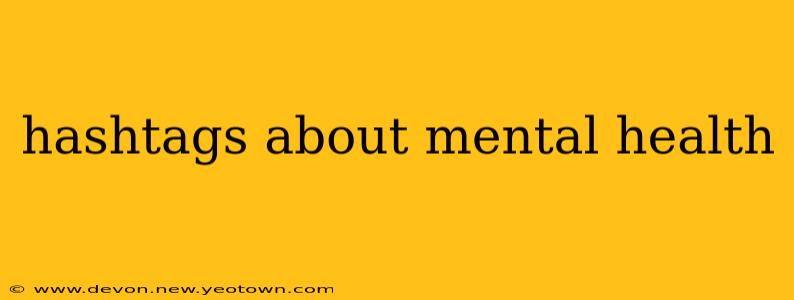#HashtagsAboutMentalHealth: A Journey of Understanding and Support
The world of hashtags can feel overwhelming, especially when navigating sensitive topics like mental health. Finding the right hashtags can be the key to connecting with communities, finding support, and raising awareness. But it's more than just slapping on a few popular tags; it's about choosing hashtags that resonate with your message and contribute to a positive and helpful online space. This isn't just about numbers; it's about connection.
My journey into researching hashtags for mental health began with a simple search. I was surprised by the sheer volume—a testament to the growing conversation around mental wellness. But amidst the abundance, I discovered a crucial need for thoughtful selection and responsible use. This isn't just about visibility; it's about creating an inclusive and supportive environment.
Navigating the Landscape of Mental Health Hashtags
Let's explore some categories and examples, keeping in mind the nuanced nature of this conversation:
Broad Awareness & General Support:
- #MentalHealthMatters: This is a cornerstone hashtag, widely recognized and used to express the importance of mental well-being.
- #MentalHealthAwareness: A classic choice for raising awareness and promoting understanding.
- #MentalWellness: This focuses on the positive aspects of mental health, emphasizing proactive care and self-improvement.
- #YouAreNotAlone: A powerful hashtag offering solidarity and reassurance to those struggling.
- #ItsOkayToNotBeOkay: This validates feelings and encourages open communication about mental health struggles.
Specific Mental Health Conditions:
Using hashtags for specific conditions requires sensitivity. While it can help connect individuals facing similar challenges, it's crucial to avoid stigmatizing language or overly simplistic representations.
- #AnxietyAwareness: For discussions around anxiety disorders and related experiences.
- #DepressionAwareness: A space to share experiences, resources, and support related to depression.
- #BipolarAwareness: For raising awareness and promoting understanding of bipolar disorder.
- #PTSDawareness: A platform for sharing experiences and resources related to post-traumatic stress disorder.
- #SchizophreniaAwareness: A space for promoting education and reducing stigma around schizophrenia. (Use caution and be mindful of the language used.)
Important Note: When using hashtags for specific conditions, ensure you're using accurate and respectful language. Avoid casual or insensitive terminology.
Support and Resources:
These hashtags can connect individuals with helpful resources and support networks.
- #MentalHealthResources: For sharing links to websites, helplines, and other valuable resources.
- #MentalHealthSupport: A hashtag for connecting with support groups and communities.
- #SelfCare: Focuses on activities and practices promoting mental well-being.
- #Mindfulness: Related to practices promoting present moment awareness and stress reduction.
Community Building and Personal Stories:
These hashtags encourage sharing personal experiences and building connections.
- #MentalHealthJourney: For sharing personal experiences and progress.
- #MentalHealthCommunity: For connecting with others facing similar challenges.
- #MentalHealthStory: Encourages sharing personal narratives to break down stigma.
Questions People Often Ask About Mental Health Hashtags:
What are some effective hashtags to reach a larger audience? A mix of broad and specific hashtags is ideal. Start with widely used tags like #MentalHealthMatters and then add more specific ones relevant to your post's content.
How do I choose the right hashtags for my post? Consider your target audience and the message you want to convey. Choose hashtags that accurately reflect the content and tone of your post.
Are there any hashtags I should avoid? Avoid hashtags that promote harmful behaviors or perpetuate negative stereotypes. Always be mindful of the language you use.
How can I use hashtags responsibly? Be mindful of the potential reach of your post and the impact your words may have. Use hashtags thoughtfully and avoid using too many, which can be overwhelming. Focus on quality over quantity.
This journey of exploring mental health hashtags isn't just about finding the right keywords; it's about building a compassionate and supportive online community. It’s about amplifying voices, sharing resources, and fostering understanding. By using hashtags responsibly and thoughtfully, we can contribute to a more positive and helpful online space for those navigating the complexities of mental health.

